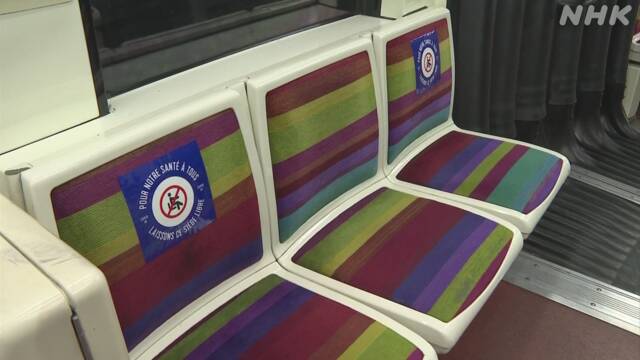Paris has a lot of restrictions on going out Penalties to prevent congestion on public transportation 9:57 on June 7
In France, restrictions on going out have been greatly relaxed since last month, but in the metropolitan area including Paris and its suburbs, strict measures with penalties are taken to prevent congestion of public transportation.
Of these, on the subway used by many citizens, round marks are attached to the platforms on the station premises and floors inside the trains so that passengers can keep a sufficient distance.
Face-to-face seats are also designed so that passengers can only sit diagonally so that they do not face the front.
To avoid congestion during the morning and evening commuting hours, working from home and staggered commuting are encouraged, and those who use the subway during this time are obliged to carry a commuter certificate issued by their office. It is being done.
If the patrolling police officers are checking unannounced and riding without a certificate, a fine of EUR 16,000 or JPY 16,000 will be imposed.
As a result of these measures, the subway is not crowded and the commuting hours are limited.
Citizens' reactions were generally positive, and many people using train stations in central Paris said, “I think it's a good thing because too much congestion increases the possibility of infection.”
On the other hand, there were also opinions as to whether various restrictions on public transportation are effective as a countermeasure against infection, "is it meaningful that many people are already out?"
In Paris, a company that operates subways and buses has also added a function that shows congestion status in real time for each route to a dedicated app.
Based on information from passengers, the application displays the situation inside the car in five stages from "occupied seats" to "crowded so that it is difficult to get off", and the time saved for users is as low as possible. It will be helpful for getting on.
In France, governments and local governments are calling for bicycles instead of public transport and private cars, and the city of Paris has a total of 50 parts of the driveway that runs along three particularly busy subway lines. Kilo has been made into a temporary bicycle lane.
These movements are widespread in urban areas throughout France, with provisional cycling lanes totaling 1,000 kilometers, and according to the government, bicycle use increased by 44% compared to before going out. about it.

